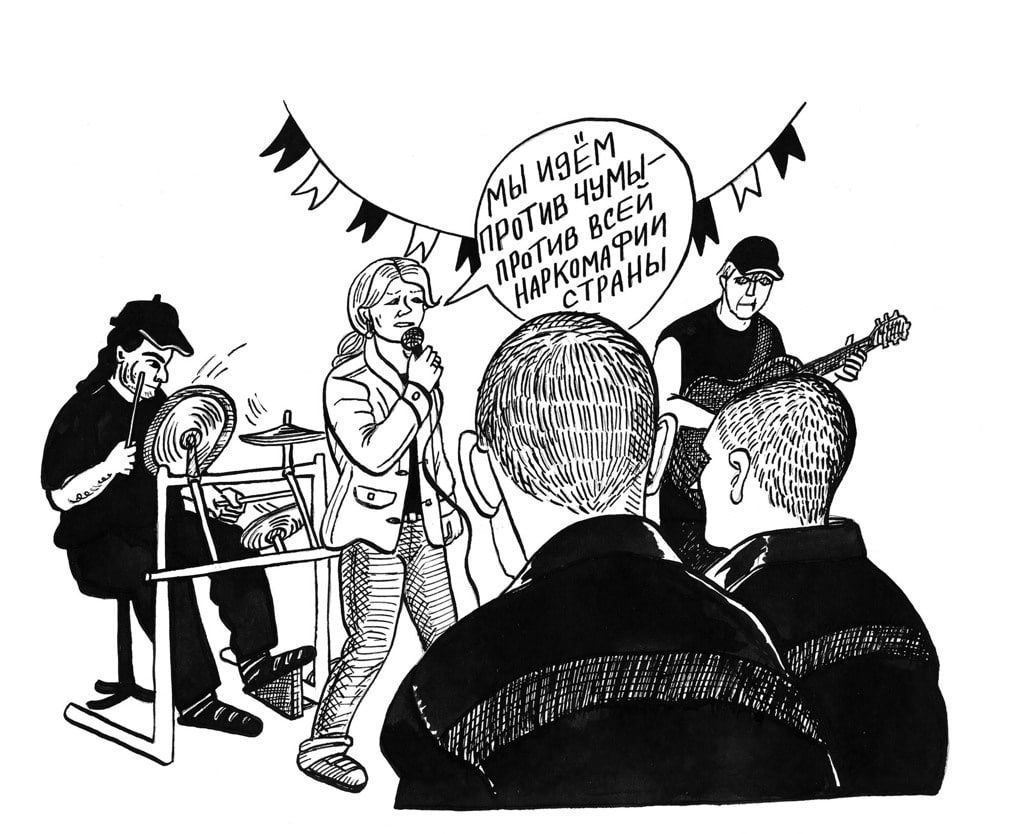28 April 2022 I just finished reading Other Russias, a 2017 book by cartoonist and activist Victoria Lomasko. It is a collection of illustrated chronicles, i.e. drawings and interviews put together by the author over eight years of travelling around Russia. Although it came out some time ago, the stories it tells and the immediate style with which it does so remain relevant.

Victoria Lomasko, Other Russias, page 60. (n+1)
The book is divided into two parts: "Invisibles" and "Angry". The angry ones are "people trying to claim rights that the state has taken away from them": the protesters who took part in the opposition protests in Moscow in 2012; Nadja Tolokonnikova and Marija Alyechina, from the punk group Pussy riot; the lgbt+ community; the truckers on strike in 2015. The invisibles are the Central Asian immigrants exploited in Moscow shops, the men seeking refuge in Orthodox fanaticism, the sex workers, the women living alone in abandoned suburbs.
"Given that the majority of the Russian population is 'invisible' to itself and to the rest of the world, this category could be expanded ad infinitum. What distinguishes the invisibles, in any case, is their social isolation: they have no way of 'advancing' in life, and no access to the public scene," Lomasko writes.
Invisible schools
In this first part, two chapters struck me in particular: one is dedicated to the teachers and pupils of a rural school, the other describes some inmates of a juvenile prison where the author has been volunteering for four years.
The school is in Nikolskoe, a village about two hundred kilometres from the capital. It has 23 children and ten teachers, many of whom come from the surrounding area, and no gym or canteen. "A kitchen has been set up behind the bookshelves in the largest classroom. The cook is the grandmother of one of the pupils". The nearest town, Tula, can be reached by bus in an hour and a half. There are no buses to the next village, Krapivna, or to the provincial capital.
The road to Krapivna, which is used by several of the school's teachers, crosses a river which in springtime bursts its banks and floods the bridge. In order to get to the opposite bank, people have to get into a small boat with an engine that keeps jamming, so most of the time they row. Teachers have to cross the river twice a day.
Prisoners
The prison, on the other hand, is in Možajsk, a town about a hundred kilometres from Moscow. Lomasko runs a drawing course attended by a dozen young inmates.
"We didn't have a lot of resources. To get to Možajsk, we took commuter trains, carrying class materials in our backpacks, mainly black pens and paper. The centre I worked with organised the trip once a month, and if you missed the train you had to wait for the next month. The students in the class are changing all the time, because in the meantime some have been paroled, others have been transferred, and others are being added. Some show that they have had a good education, others never seem to have entered a school. Many have psychological problems.
"Since our meetings were very infrequent, I focused on developing analytical thinking (how to structure the drawing) and empathy (working on the image). It was also crucial to help the children to have self-confidence, so we would show their work at exhibitions, photograph them and then take the photos back to prison." The plan would be to collect all the drawings, photos and lesson plans in a catalogue, but it fails. "All the project materials are currently kept at the Reina Sofía museum in Madrid, Spain. If they had remained in Russia they would have risked disappearing".
Lomasko talks about the book - which exists in an English edition, but is also available in French and Spanish - in an interview published in East Journal (translated into Italian). The book was reviewed in the Los Angeles Review of Books.
Translated from Italian.


